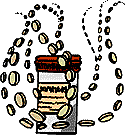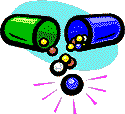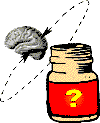By Melissa Lee Phillips
Neuroscience for Kids Consultant
September 25, 2002
 The sale of herbal supplements has become a multimillion dollar industry.
Companies now sell many different herbal extracts, claiming that they can
help with a variety of problems such as low energy, memory loss, and
obesity. Unfortunately, few of these claims have been substantiated by
scientific studies exploring the effectiveness of these supplements. One
particularly popular herbal supplement is ginkgo.
Ginkgo is extracted from the leaves of the ginkgo biloba tree.
Manufacturers of this supplement claim that ginkgo can improve memory
abilities in normal, healthy subjects in as few as four weeks. Results
from a study published in the August 21, 2002 issue of Journal of the
American Medical Association (JAMA) suggest otherwise.
The sale of herbal supplements has become a multimillion dollar industry.
Companies now sell many different herbal extracts, claiming that they can
help with a variety of problems such as low energy, memory loss, and
obesity. Unfortunately, few of these claims have been substantiated by
scientific studies exploring the effectiveness of these supplements. One
particularly popular herbal supplement is ginkgo.
Ginkgo is extracted from the leaves of the ginkgo biloba tree.
Manufacturers of this supplement claim that ginkgo can improve memory
abilities in normal, healthy subjects in as few as four weeks. Results
from a study published in the August 21, 2002 issue of Journal of the
American Medical Association (JAMA) suggest otherwise.
 Paul Solomon, Ph.D., and his colleagues at Williams
College studied the effects of a commonly available ginkgo supplement in
203 healthy subjects over the age of 60 years. None of the subjects had
any previous memory problems. Before the study began, all participants
completed 14 standard tests that measured their memory, concentration,
attention, and learning abilities. They also filled out questionnaires
that asked them to evaluate their own memory skills. For the next six
weeks, half of the subjects took ginkgo according to the manufacturer's
instructions: 120 mg per day (40 mg, 3 times a day). The other half of
the participants took a placebo pill, made only of sugar. The study was
double-blind; in other words, neither the study's subjects nor the
researchers evaluating the data knew which participants took ginkgo and
which took the placebo. After six weeks of taking ginkgo (or the
placebo), the subjects repeated all 14 psychological tests and the
questionnaire. Additionally, a companion of each participant -- perhaps a
spouse, family member, or close friend -- was asked to complete a
questionnaire, evaluating the subject's memory changes over those six
weeks based on their own observations. Paul Solomon, Ph.D., and his colleagues at Williams
College studied the effects of a commonly available ginkgo supplement in
203 healthy subjects over the age of 60 years. None of the subjects had
any previous memory problems. Before the study began, all participants
completed 14 standard tests that measured their memory, concentration,
attention, and learning abilities. They also filled out questionnaires
that asked them to evaluate their own memory skills. For the next six
weeks, half of the subjects took ginkgo according to the manufacturer's
instructions: 120 mg per day (40 mg, 3 times a day). The other half of
the participants took a placebo pill, made only of sugar. The study was
double-blind; in other words, neither the study's subjects nor the
researchers evaluating the data knew which participants took ginkgo and
which took the placebo. After six weeks of taking ginkgo (or the
placebo), the subjects repeated all 14 psychological tests and the
questionnaire. Additionally, a companion of each participant -- perhaps a
spouse, family member, or close friend -- was asked to complete a
questionnaire, evaluating the subject's memory changes over those six
weeks based on their own observations.
 The researchers found no differences between the memory
abilities of people in the ginkgo group and those in the placebo group.
Both groups performed slightly better in the memory tests the second time.
This observation may be the result of practice: subjects were better the
second time simply because they had taken the tests before. There were
also no differences between the self-questionnaire results of the two
groups. The researchers found no differences between the memory
abilities of people in the ginkgo group and those in the placebo group.
Both groups performed slightly better in the memory tests the second time.
This observation may be the result of practice: subjects were better the
second time simply because they had taken the tests before. There were
also no differences between the self-questionnaire results of the two
groups.  Those subjects taking gingko were no more likely to think that their own
memory abilities had improved over the six weeks. Similarly, the
companions of people in the ginkgo group reported no more noticeable
memory changes than the companions of people in the placebo group.
Those subjects taking gingko were no more likely to think that their own
memory abilities had improved over the six weeks. Similarly, the
companions of people in the ginkgo group reported no more noticeable
memory changes than the companions of people in the placebo group.
The researchers acknowledge that their study is not conclusive. It is
possible that the study's participants did not take the supplement for a
long enough time period or perhaps the subjects did not take a high enough
dosage. The study also did not address the possibility that ginkgo might
be effective for people with memory problems such as Alzheimer's disease or other forms of dementia. Indeed,
there is some experimental evidence to suggest a possible benefit of
ginkgo for Alzheimer's patients. Nevertheless, according to the
manufacturer's claims, a normal, healthy person should have noticed
improvements in memory in just four weeks with this dosage. But according
to the new JAMA study, for those people simply wishing for better
memory...forget ginkgo. |


 Hear IT!:
"Placebo"
Hear IT!:
"Placebo"
 For
references and more information, see:
For
references and more information, see:![[email]](./gif/menue.gif)


